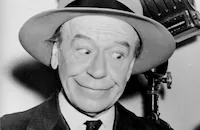The Last Gentleman
Brief Synopsis
Cast & Crew
Sidney Lanfield
George Arliss
Edna May Oliver
Janet Beecher
Charlotte Henry
Ralph Morgan
Film Details
Technical Specs

Synopsis
Cabot Barr, a wealthy Massachusetts eccentric, summons his family to his house for a memorial service for his niece Lovicy, a missionary in China who may or may not be dead. The real purpose of this gathering, however is to look his family over and contemplate his will. He is sorely disappointed in his only living son, Judd, a greedy man who keeps a book of Cabot's eccentricities with which to blackmail him. Cabot is also discontented with his daughter-in-law Helen, whose sole offspring with his late son Warren was a girl, Marjorie, who is unable to carry on the family name because she is female. Although they share a genuine affection, Cabot and Helen quarreled violently after Marjorie's birth and have not spoken in the sixteen years since. Helen and Marjorie still attend the gathering, though, hoping that Cabot's invitation is a peace offering. Also in attendance are Cabot's emotional sister, Augusta Prichard, her adopted son, Allan Blaine, Judd's wife Retta, Cabot's friend, Henry Loring, and Cabot's longtime butler, Claude. Cabot ignores Marjorie at first, but her delight in her grandfather's odd ways gradually wins him over, even when she plays a prank on him in order to prove to Allan that she is not interested in Cabot's money. In a quiet moment alone with her, Cabot confesses his affection, but still bemoans her gender. She jokingly suggests that maybe her future husband will change his name to Barr, which sets Cabot scheming to start a romance between her and Allan, who he hopes will change his name to Barr. Cabot's use of reverse psychology does bring the young lovers together, but when they announce their engagement, Allan refuses to change his name. The infuriated Cabot then denounces them both and changes his will to leave everything to Judd instead of them. Unfortunately for Judd, he chooses that moment to bring an alienist, Professor Schumaker, to examine Cabot, in the hope of getting Cabot declared legally incompetent and thereby acquiring his fortune. Cabot quickly convinces Schumaker that he is sane and that it is Judd who suffers from delusions. After throwing Judd out, Cabot tells his remaining family about the type of memorial he wants and has them send for a doctor. Some time later, Cabot dies quietly in his sleep, and Henry and Claude arrange the family in their proper places for the reading of Cabot's will. The family is stunned to find out that Cabot recorded his will on film and timed his jokes so well with their anticipated reactions that it seems as if he is there with them. In the filmed will, Cabot disinherits Judd, leaving him only a few eccentric items. He is generous to the rest of his family and friends, and Allan, who now agrees to change his name to Barr when he marries Marjorie, receives the bulk of his estate with her.

Director
Sidney Lanfield
Cast

George Arliss

Edna May Oliver

Janet Beecher

Charlotte Henry

Ralph Morgan

Edward Ellis

Frank Albertson

Rafaelo Ottiano

Donald Meek

Joseph Cawthorn
Harry C. Bradley
Helena Phillips
Lou Salter
Oscar Rudolph
Lew Sergeant
Crew
William Bridgehouse
Bob Comer
Bob Comer
Jack Dawn
Richard Day
Roy Dumont
Bill Forsyth
William Goetz
Kenny Green
Raymond Griffith
Julia Heron
Martin Hershey
Clarence Hewitt
Maude T. Howell
Maude T. Howell
Jimmy Jackson
Barney Mcgill
Emily Moore
Alfred Newman
William Phillips
Leonard Praskins
Charles Rose
Joseph M. Schenck
Paul Schofield
Ben Silvey
Orville Stewart
Vincent Vernon
Gwen Wakeling
Robert Webb
William Whitley
Harold Wilson
Vernon Wilson
Maurice Wright
Darryl F. Zanuck

Film Details
Technical Specs

Quotes
Trivia
Notes
The working title of this film was Head of the Family. According to a Hollywood Reporter news item, Charlotte Henry was borrowed from Paramount for this production.












